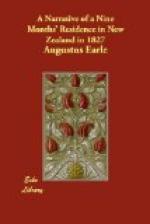Painting and sculpture are both arts greatly admired by these rude people. Every house of consequence is ornamented and embellished, and their canoes have the most minute and elaborate workmanship bestowed upon them.
Their food is always eaten out of little baskets, rudely woven of green flax; and as they generally leave some for their next meal, they hang these baskets on sticks or props, till they are ready to eat again. Thus a village presents a very singular appearance, as it is stuck full of sticks, with various kinds of baskets hanging from them. This plan, however, is the most rational that could be adopted, as none of their eatables can be left on the ground, or they would become the prey of the hogs and dogs.
In the course of our long ramble we noticed many pretty little huts, some having neat gardens all round them, planted with fruits and corn. One house which we saw was built by a chief who had made several voyages to Port Jackson, and it was really a very comfortable dwelling. It had a high door, which we could enter without stooping, and in a separate room was constructed a bed, after the pattern of one on ship-board. He had likewise a large sea-chest in his house, the key of which (highly polished) was hung round his neck as an ornament. In the course of our walk we came to a spot on which a group of old people were sitting sunning themselves, and they immediately all rose to welcome us. I remarked one amongst them who seemed, from his silvery locks and feeble limbs, to be very old. I asked him, among other questions, whether he remembered Captain Cook. He said he did not, but well recollected Captain Furneaux, and was one of the party which cut off and massacred his boat’s crew; and from other information which I received I believe his assertion to have been correct.[3]
FOOTNOTES:
[Footnote 3: Captain Furneaux’s account of this massacre is printed in the Appendix.]
CHAPTER IV.
The Hokianga river eighty years ago.
As our missionary passengers had by this time fixed upon the spot where they intended to establish their settlement, and it being several miles up the river, we got under weigh to proceed thither. The captain’s agreement being to that effect, we proceeded with the first fair wind, about twenty miles up the stream, which was as far as we could with safety take the vessel. The shores on each side this noble river are composed of hills gradually rising behind each other, most of them covered with woods to the water’s edge. Not a vestige of a habitation is to be seen, and if it had not been for the occasional sight of a canoe, we might have imagined the country to be totally uninhabited. Opposite a small island, or, rather, sand-bank, the vessel grounded, and had to remain there till the next tide floated her off.




